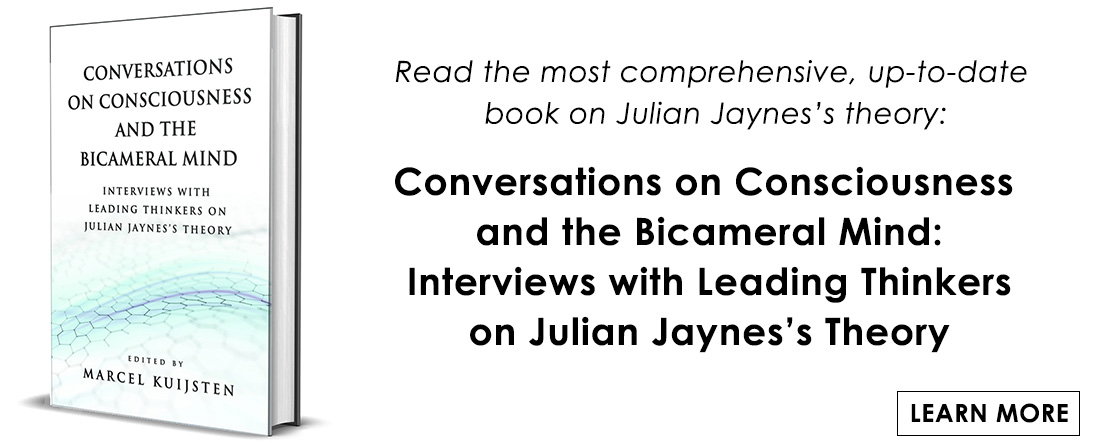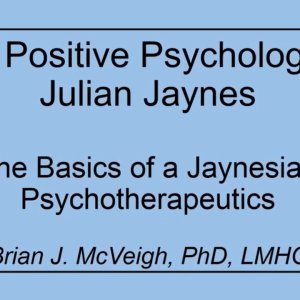“Fear must be overcome again and again.”
― Abraham Maslow
“The problem is the problem, the person is not the problem.”
― Michael White and David Epston
"Consciousness is a much smaller part of our mental life than we are conscious of, because we cannot be conscious of what we are not conscious of."
― Julian Jaynes
The human mind, in its intricate complexity, has captivated thinkers and scholars for centuries. Exploring its evolution, particularly the development of consciousness, may offer valuable insights into enhancing our mental well-being in the modern world. Julian Jaynes, in his groundbreaking work The Origin of Consciousness in the Breakdown of the Bicameral Mind (1976), proposed a controversial yet thought-provoking theory: that ancient humans experienced consciousness in a fundamentally different way than we do today. Jaynes argued that early humans possessed a "bicameral mind," where the two hemispheres of the brain operated more independently, and inner thoughts were perceived as external voices, often attributed to gods or other supernatural beings. This suggests that our capacity for introspection, self-awareness, and the internal dialogue that characterizes modern consciousness is a relatively recent development in human history.
This evolutionary leap, according to Jaynes, brought about a profound shift in the human experience. As we gained the capacity for self-reflection, we also became aware of our own individuality, our separateness from the world around us, and the limitations of our own existence. This newfound awareness, while empowering in many ways, can also be a source of anxiety and distress. The internal dialogue, once a source of divine guidance in the bicameral mind, may now become a source of self-criticism, doubt, and fear. Furthermore, our increasing disconnect from the natural world, a world that once provided a sense of belonging and interconnectedness, may exacerbate these anxieties (Baxter & Pelletier, 2018).
Integrating Jaynes' ideas with contemporary therapeutic approaches like Voice Therapy (Firestone, 2008) and Narrative Therapy (White & Epston, 1990), incorporating the philosophy of self-transcendence (Maslow, 1971), and recognizing the profound importance of our connection to nature (Baxter & Pelletier, 2018), offers a holistic and potentially transformative approach to addressing these challenges. By understanding the origins of our inner voices and the anxieties that fuel them, and by cultivating a sense of connection to ourselves, others, and the natural world, we can begin to reclaim our mental well-being and navigate the complexities of modern life with greater clarity and purpose.
Recognizing and Challenging the "Voices" Within
One of the key implications of the bicameral mind theory is that our inner thoughts and anxieties, which often manifest as negative self-talk or intrusive worries, may be remnants of this earlier mode of consciousness, where inner experiences were perceived as external commands. These voices, once attributed to gods or ancestors, may now be internalized as our own critical inner voice, perpetuating a cycle of self-doubt and anxiety. By recognizing these "voices" as internal rather than external, we can reclaim a sense of agency and control.
This aligns with the core principles of Voice Therapy, which focuses on identifying and challenging the "critical inner voice" that often fuels self-destructive behaviors and negative thoughts. Jaynes suggests that the "voices" heard by bicameral people arose from the right hemisphere, a less conscious part of the brain. This links to Voice Therapy, where identifying the source of our inner critic is key.
Narrative Therapy complements this approach by encouraging us to externalize these voices, viewing them as separate from our core identity. This allows us to challenge their authority, deconstruct their narratives, and ultimately rewrite our relationship with them. This process of recognizing and challenging inner voices can be seen as a step towards self-transcendence, as we move beyond the limitations of our ego and connect with a deeper sense of self, finding meaning and purpose in our lives (Frankl, 1963).
Re-authoring Our Life Stories
Just as ancient people relied on myths and narratives to provide structure and meaning, we can consciously create positive narratives for ourselves. Challenging negative self-talk and replacing it with affirmations and empowering beliefs can help reframe our inner dialogue and foster a more positive mindset. This resonates with both Voice Therapy, which emphasizes separating from the destructive influence of the "anti-self," and Narrative Therapy, which encourages deconstructing negative narratives and re-authoring our life stories with a focus on strengths and resilience.
This process of re-authoring our narratives can be a powerful tool for self-transcendence, allowing us to move beyond limiting beliefs and create a more meaningful and purposeful life (Wong, 2016). By actively shaping our narratives, we can find a sense of purpose and meaning that extends beyond our individual existence.
Finding Strength in Community and Connection
Recognizing the importance of community and connection can be crucial for mental well-being. The bicameral mind thrived in a collective environment, and seeking out supportive communities can provide a sense of belonging and shared experience. Both Voice Therapy and Narrative Therapy acknowledge the significance of healthy relationships and encourage building supportive communities that reinforce positive narratives.
Connecting with others and contributing to something larger than ourselves is a key aspect of self-transcendence, allowing us to find meaning and purpose beyond our individual concerns (Van Dierendonck & Mohan, 2019). By engaging in meaningful relationships and contributing to a shared purpose, we can transcend the limitations of our individual existence and find a sense of belonging and connection that provides solace and support.
Exploring Creative Outlets and Hobbies
In addition to social connections, exploring creative outlets and engaging in hobbies can provide a sense of purpose, joy, and connection to something beyond ourselves. Music, art, writing, sports, and other activities can offer opportunities for self-expression, skill development, and a sense of flow (Csikszentmihalyi, 1990). These activities can help us connect with our inner selves, express our creativity, and find joy and fulfillment in the process.
Cultivating Present Moment Awareness through Mindfulness
Cultivating present moment awareness through mindfulness can help reduce rumination and worry, which are common features of depression and anxiety. While not explicitly addressed in Voice Therapy, mindfulness complements its focus on self-awareness and challenging negative thoughts. In Narrative Therapy, mindfulness can help us become more conscious of the stories we are telling ourselves, allowing us to choose more empowering narratives.
Mindfulness practices can also facilitate self-transcendence by helping us connect with a deeper sense of awareness, appreciate the present moment, and experience the interconnectedness of all things (Kabat-Zinn, 2003). By fully embracing the present moment, we can transcend the anxieties of the past and future, finding peace and contentment in the here and now.
Reconnecting with Nature
In addition to these therapeutic approaches, reconnecting with nature can be a powerful antidote to the anxieties of modern life. As Baxter and Pelletier (2018) argue, our innate need for nature is a fundamental aspect of our psychological well-being. Spending time in nature can reduce stress, improve mood, and enhance our sense of connection to something larger than ourselves. By immersing ourselves in the natural world, we can tap into a deeper sense of belonging and interconnectedness, fostering a sense of awe and wonder that can transcend our everyday worries and fears.
Integrating Ancient Wisdom and Modern Therapeutic Approaches
By integrating the principles of Voice Therapy and Narrative Therapy, incorporating the philosophy of self-transcendence, recognizing the profound importance of our connection to nature, and exploring creative outlets and hobbies, we can embark on a journey towards greater mental well-being. We can learn to identify and challenge our critical inner voice, deconstruct negative narratives, and re-author our life stories with a focus on strengths and resilience. Building a supportive community, cultivating mindfulness, and reconnecting with nature can further enhance our journey toward a more profound sense of connection to ourselves and the world around us, allowing us to live a more fulfilling life.
It's crucial to remember that these approaches are not replacements for professional mental health treatment. If you are struggling with depression or anxiety, seeking help from a qualified therapist or counselor is essential. However, exploring these unique perspectives can offer valuable insights and tools for navigating the complexities of mental health and fostering a more fulfilling and balanced life.
References
Baxter, D. E., & Pelletier, L. G. (2018). Is nature relatedness a basic human psychological need? A critical examination of the extant literature. Canadian Psychology/Psychologie1 canadienne, 60(1),2 1-13.
Csikszentmihalyi, M. (1990). Flow: The psychology of optimal experience. Harper & Row.
Firestone, R. W. (2008). Voice therapy: Integrating the voices of the mind in psychotherapy. Karnac Books.
Frankl, V. E. (1963). Man's search for meaning. Beacon Press.
Jaynes, J. (1976). The origin of consciousness in the breakdown of the bicameral mind. Houghton Mifflin Harcourt.
Kabat-Zinn, J. (2003). Mindfulness-based stress reduction (MBSR): The program. Health Communications, Inc.
Maslow, A. H. (1971). The farther reaches of human nature. Viking Press.
Van Dierendonck, D., & Mohan, K. (2019). Spirituality in the workplace: Theory, research and application. Springer.
White, M., & Epston, D. (1990). Narrative means to therapeutic ends. W. W. Norton & Company.
Wong, P. T. P. (2016). The human quest for meaning: Theories, research, and applications. Routledge.
Additional Information

Julian Jaynes Society - Exploring Consciousness and the Bicameral Mind Since 1997
The primary goals of the Julian Jaynes Society are to foster discussion and a better understanding of the life, work, and theories of Julian Jaynes, the implications of his bicameral mind theory of consciousness, and the topic of consciousness in general.
The Self-Healing Mind: Harnessing the Active Ingredients of Psychotherapy
Evolutionary psychology explains why some mental illnesses developed, but to answer questions about how to improve our mental well-being in the face of these challenges--how the mind works to heal itself-we should look to more recent changes in...
forum.psychlinks.ca

Julian Jaynes, Positive Psychology & Personal Growth with Dr Brian McVeigh
Please Watch the Introductory Julian Jaynes videos here, to get the most out of this Meetup: https://youtube.com/playlist?list=PLqpF1l8gdXlHzVrJjI2wDqMiA7qse...
forum.psychlinks.ca
